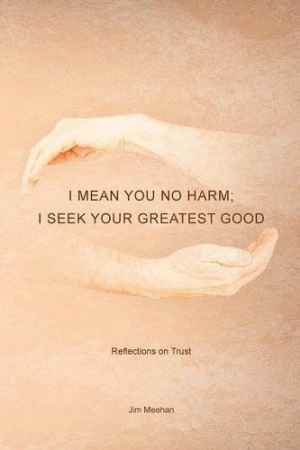I Mean You No Harm; I Seek Your Greatest Good
Reflections on Trust
It’s an interesting exercise to consider, and give a grateful nod to, those who have shaped the person we have become.
In his personal memoir, I Mean You No Harm; I Seek Your Greatest Good, Jim Meehan establishes the tenet that has shaped his life, and highlights—in well-organized and carefully structured narrative portraits—those who were instrumental in helping him develop the personal mantra in the title. Meehan is a psychologist, poet, and philosopher seeking to understand and isolate some answers on how to create and identify trust in relationships.
Starting with his early years and drawing parallels between his own life and that of Paul McCartney—the two were born in the same year and at the same hospital in Liverpool—Meehan recalls the mysterious way in which the words of his personal mantra came to him, comparing it to the anecdote about McCartney waking up after having dreamed of the tune and lyrics to what would become his hit song “Yesterday.” In trying to uncover the influences driving those words, Meehan examines those relationships that were most instrumental in shaping who he ultimately became. He does this through anecdotes, which he then carefully analyzes in a clear, conversational tone.
Meehan identifies his childhood relationship with his mother as one that contributed to his eventual realization of his ten-word credo. From there, he recounts those people who positively influenced him, identified simply as his “mentors,” including renowned psychologist Dr. William E. Hall, specifically their discussions on empathy and its role in personal identity and successful relationships.
Meehan’s focus is on the wholeness connecting individual, disparate experiences, which he conveys clearly through direct language. That recognition of the connectedness between all people is central to recognizing who we are as individuals. “My philosophy of life stresses more the unity of things rather than their separation,” he writes. “Self-realization is a search for truth.” It is clear from the outset that Meehan wrote this narrative to better cement that truth, to commit it to paper in a logical and clearly defined manner—a goal he successfully realizes by the book’s end.
It’s an interesting exercise to consider, and give a grateful nod to, those who have shaped the person we have become. Meehan closes his narrative by including personal poems that he has authored over the years, all written to understand and uncover love as a result of complete mutual trust. While some might find this inclusion unnecessary, or at worst, trite, Meehan boldly defends his sentimentality by again returning to McCartney. “I really don’t mind being sentimental,” he quotes McCartney as saying. “I know a lot of people look on it as uncool. I see it as a pretty valuable asset.”
Meehan shares a well-rendered and thoughtfully illustrated perspective on life, as well as his appreciation for the psychological understanding and awareness that have only enhanced it.
Reviewed by
Amanda Silva
Disclosure: This article is not an endorsement, but a review. The publisher of this book provided free copies of the book and paid a small fee to have their book reviewed by a professional reviewer. Foreword Reviews and Clarion Reviews make no guarantee that the publisher will receive a positive review. Foreword Magazine, Inc. is disclosing this in accordance with the Federal Trade Commission’s 16 CFR, Part 255.

